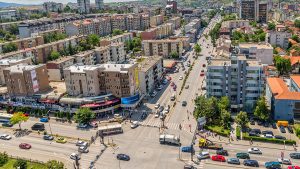 Dr Aidan Hehir is a Reader in International Relations at the University of Westminster. He recently completed a project part-funded by Robert Bosch Stifung and in collaboration with the RIT Kosovo “Peace and Conflict Program” examining perceptions of the Kosovo Specialist Chambers, and the potential for its proceedings to generate instability in Kosovo. The project comprised a series of workshops held in Pristina as well as interviews with officials from the Kosovo Specialist Chambers, international organisations working on transitional justice (especially in Kosovo and the former Yugoslavia), legal experts, civil society organisations, academics, and journalists.
Dr Aidan Hehir is a Reader in International Relations at the University of Westminster. He recently completed a project part-funded by Robert Bosch Stifung and in collaboration with the RIT Kosovo “Peace and Conflict Program” examining perceptions of the Kosovo Specialist Chambers, and the potential for its proceedings to generate instability in Kosovo. The project comprised a series of workshops held in Pristina as well as interviews with officials from the Kosovo Specialist Chambers, international organisations working on transitional justice (especially in Kosovo and the former Yugoslavia), legal experts, civil society organisations, academics, and journalists.

The Kosovo Specialist Chambers (KSC) was established in August 2015; despite initially generating much commentary, the lack of any indictments to date has meant it has become increasingly peripheral, with some already labelling it a “ghost court”.
Yet, while the pace of the process has frustrated many, at some point, indictments willbe issued. Unfortunately, when they are, there is a strong possibility that far from catalysing a new era for Kosovo, the KSC may well inadvertently precipitate instability.
An Important Step?
Transitional justice is predicated on the belief that post-conflict societies must deal with the past in order to move forward. Proponents – such as the EU– argue, that addressing past crimes promotes reconciliation, ensures societal stability and ultimately enables the state to develop robust institutions with popular legitimacy.
When the KSC was established, this was indeed the narrative advanced by the EU and the US; in a joint statement, their Pristina embassies declared the court was “an important step on Kosovo’s Euro-Atlantic path”, that would enable Kosovo to “achieve reconciliation and build a better future.” Yet, the actual means by which the KSC was established were themselves at odds with the EU’s own prescriptions.
Local Ownership
Within the voluminous literature on how to make transitional justice effective, certain core prescriptions repeatedly appear. One relates to the need for local ownership; there is widespread agreement that transitional justice can only be effective – in terms of promoting reconciliation, societal stability and fostering new public confidence in national institutions – if the process is both driven and supported by national authorities, the general public and domestic civil society. As noted by the EU, “Transitional justice can only reach its goals if the process of its design and implementation is nationally and locally-owned…It is essential that the process is initiated and driven by government authorities and local civil society”.
In the case of the KSC, however, the opposite was the case; though established by Kosovo’s parliament and based on Kosovo’s constitution, the court is based in The Hague, staffed by non-Kosovars and more importantly, its creation was driven by external actors. Debates on establishing the court in the Kosovo Assembly were marked by public protests, and MP’s initially rejected the court. It was established only after sustained and overt international pressure, comprising a mixture of threats and incentives.
To the dismay of transitional justice organisations in Kosovo, political figures who spoke in favour of the KSC did so reluctantly and in purely instrumental terms, invariably presenting the court as an unpleasant hurdle that had to be leaped in order to reap certain monetary and geopolitical gains. Indicatively, the then Prime Minister Hashim Thaci supported the court whilst describing it as “the biggest injustice and insult which could be done to Kosovo and its people”. Thaci subsequently declared he only supported the court because he was “under great pressure from the international community”.
Opposition to the court increased in the wake of the formation of a new government in September 2017 comprising a so-called “war wing” coalition of parties linked to the KLA; in December 2017, a group of MPs attempted to revoke the KSC and the effort was abandoned only after more international pressure, with the ‘Quint’ warning of “severe negative consequences”.
Lacking Public Support
A series of interviews and workshops conducted as part of this project, revealed that public support for, and understanding of, the KSC remains low, while many fear the KSC will have a negative impact on societal stability and inter-ethnic relations. Civil society organisations within Kosovo, and throughout the former Yugoslavia, blamed the Government of Kosovo for the court’s limited popular legitimacy and the pervasive lack of public understanding of the KSC’s remit and procedures. The absence of governmental efforts to boost the legitimacy of the court, has meant that its opponents have been free to spread propaganda, further degrading public perceptions of the KSC.
Yet, this can hardly be a surprise; none of Kosovo’s main political parties suggested establishing the court, while the main opposition party Vetëvendosje vociferously opposes it. The current governing coalition have little interest in facilitating the process given their association with the very criminality under examination. Transitional justice organisations noted that the lack of governmental support had left pro-KSC civil society organisations isolated, and vulnerable to intimidation and accusations of “treachery”. This underlying lack of public support for, and understanding of, the KSC is potentially ominous.
Kosovo: An Example to the World?
Since the establishment of UNMIK in 1999, Kosovo has been subjected to various forms of invasive external administration across all sectors; while this has invariably been justified as a means towards “progress” and “reconciliation”, in fact that “the internationals” have treated Kosovo as something of a prop for their own ends. Kosovo has been repeatedly used as a means by which Western actors constitute themselves by initiating ostensibly transformative and progressive processes primarily designed to highlight their own benevolence and capacity rather than improve conditions on the ground in Kosovo. Indicatively, Victoria Nuland, former U.S. assistant secretary of state for European and Eurasian Affairs, heralded Kosovo’s progress towards becoming a place where ‘all ethnicities can live in peace, because not only does the region need that but the planet needs it and Kosovo has an opportunity to set that example.”
In reality, beneath the superficial veneer constructed by its Western sponsors, Kosovo has steadily atrophied; unemployment remains high, corruption is rife, and the public mood has soured due to ongoing delays over visa liberalisation, concessions made to neighbouring states, and recent lukewarm – if not actually negative – feedback from the EU regarding future membership prospects. The underlying widespread societal frustration coupled with the lack of public understanding of, and support for, the KSC revealed through this project, thus creates a potentially toxic context in which future indictments by the KSC will emerge.
While the EU’s own prescriptions on transitional justice stress the need for local ownership, the KSC has in fact been created in a way which runs counter to this advice due to the overriding need to maintain an externally-driven process designed to perpetuate a particular image of Kosovo’s foreign sponsors. The KSC’s proceedings may well explode the international’s narrative, with potentially grave implications for peace and stability in Kosovo. With little existing domestic support for, or ownership of, the court, its indictments – highly emotive as they are given they will challenge the image of the KLA as “heroes”– are likely to precipitate political instability and possibly inter-ethnic animosity; the very opposite of what the court’s external architects promised.


